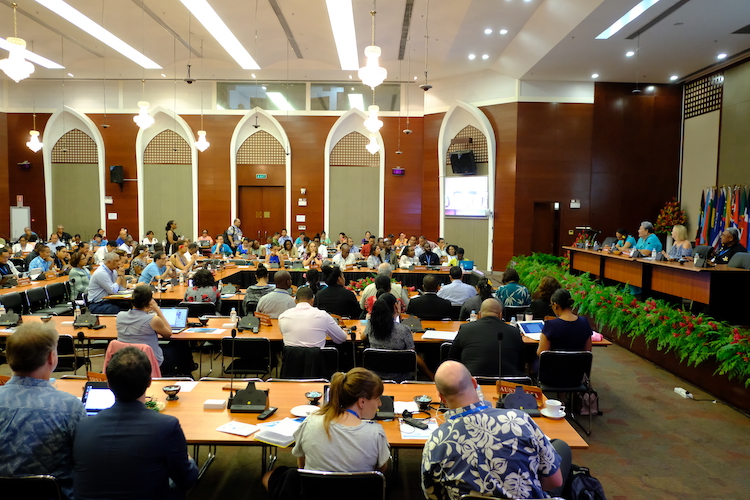By J Nastranis
NEW YORK (IDN) – Confronted with the increased effects of climate change, natural disasters, and the outsized impacts of global economic shocks on small economies, Small Island Developing States (SIDS) have resolved to strengthen their efforts to achieve sustainable development.
The ‘Apia Outcome’ – adopted at the conclusion of a three-day meeting that ended on November 1 in Apia, Samoa – will serve as the basis for the preparation of the inter-governmentally agreed Political Declaration of the High-level SIDS Midterm Review of the SAMOA Pathway, to be held in September 2019.
The Apia Outcome reaffirms that SAMOA Pathway is a standalone, overarching framework for guiding SIDS in their global, regional and national development efforts and is an integral part of the 2030 Agenda for Sustainable Development.
The Inter-regional Preparatory Meeting for the Midterm Review of the SAMOA Pathway, held from October 30 to November 1, in Apia saw countries recommit to key priority areas including climate change mitigation, disaster risk reduction, the sustainable management of oceans and improved connectivity between SIDS and between SIDS and other states.
They called for increased international support for the next five years of the SAMOA Pathway, the programme of action for small islands, especially with capacity-building, data collection and monitoring and review.
About 250 representatives from Small Island Developing States’ governments, their partners, the private sector, civil society and the UN system participated in the meeting, organized by the UN Department of Economic and Social Affairs (DESA), the UN Office of the High Representative for the Least Developed Countries, Landlocked Developing Countries and Small Island Developing States (UN-OHRLLS), and the Government of Samoa.
Representatives from the Pacific, Caribbean and Africa, Indian Ocean, Mediterranean, and South China Seas presented regional experiences and progress.
Supported by UN-OHRLLS, they will facilitate coordination, information sharing and planning on the implementation of the SAMOA Pathway and the Sustainable Development Goals (SDGs).
The meeting also included side events focused on opportunities for youth in SIDS, the sustainable ocean economy, and SIDS’ marine heritage.
“Without a doubt, this Midterm review of the SAMOA Pathway – SIDS blueprint for sustainable development – presents a key opportunity to re-examine progress and gaps, to determine priorities ahead, and to reaffirm and reinforce partnerships,” said Liu Zhenmin, UN Under-Secretary-General for Economic and Social Affairs, at the opening of the meeting in Apia.
The meeting in Apia was preceded by the Samoa Partnership Dialogue on October 29, where SIDS and their partners worked to increase the capacity of stakeholders in forging new, genuine and durable multi-stakeholder partnerships, and strengthen the monitoring and review process of partnerships in SIDS.
According to DESA, the Partnership Dialogue resulted in a set of SIDS Partnership Criteria and Norms, a SIDS Partnership Toolbox, a set of SIDS partnership case studies and an analysis of existing SIDS partnerships done by UN DESA.
“We’re small, and we cannot make progress unless we co-op all the help that we can get,” said Lois Young, Belize’s Ambassador to the UN and co-chair of the Partnership Dialogue. “It has to be a win-win situation, both for us and for those who we partner with.”
Furthermore, representatives from small island developing States also met on October 29 to launch a network of focal points who be a vital link between the global and the national levels. This network will provide a vital link between work at the global and national levels, facilitating coordination, information sharing and planning for the implementation of the SAMOA Pathway and the SDGs.
As regards the SIDS, the Barbados Programme of Action (BPOA) adopted in 1994, further complemented by The Mauritius Strategy of Implementation (MSI) of 2005 and MSI+5 Outcome document, recognized that although they are afflicted by economic difficulties and confronted by development imperatives similar to those of developing countries generally, small island developing States have their own peculiar vulnerabilities and characteristics.
SIDS’ unique and particular vulnerabilities are highlighted in ‘The Future We Want’, adopted at the UN Conference on Sustainable Development (also known as Rio+20) that took place in Rio de Janeiro, Brazil in June 2012 – their small size, remoteness, narrow resource and export base, and exposure to global environmental challenges and external economic shocks, including to a large range of impacts from climate change and potentially more frequent and intense natural disasters (para 178). SIDS continue to address those structural and external challenges to achieve their sustainable development.
The Third International Conference on SIDS was held in Apia, Samoa, in September 2014, with the overarching theme of ‘The sustainable development of small island developing States through genuine and durable partnerships’. Nearly 300 partnerships were announced at the conference and monitored through the Partnership Platform. The SIDS Accelerated Modalities of Action (SAMOA) Pathway (Samoa Pathway) adopted at the Conference addresses priority areas for SIDS and calls for urgent actions and support for SIDS’ efforts to achieve their sustainable development.
UN-DESA leads inter-agency coordination within the United Nations system through the Executive Committee of Economic and Social Affairs Plus (ECESA Plus), and among UN and non-UN entities active on SIDS issues through the Inter-Agency Consultative Group (IACG) on SIDS, to monitor the implementation of the BPOA, MSI, and the Samoa Pathway, as well as the progress being made in the SIDS partnerships.
Moreover, UN-DESA, and particularly the SIDS Unit provides technical assistance and advice, supports intergovernmental processes and reports on progress made in the implementation of the BPOA, MSI, and the Samoa Pathway. [IDN-InDepthNews – 03 November 2018]
Photo: SIDS meeting in Apia, Samoa. Credit: UN Office of the High Representative for the Least Developed Countries, Landlocked Developing Countries and Small Island Developing States.
IDN is flagship agency of the International Press Syndicate.
facebook.com/IDN.GoingDeeper – twitter.com/InDepthNews

